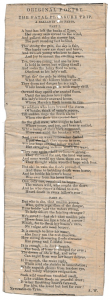Within the chest are a number of newspaper cuttings. Several of which are poems or songs. This first one is from within the pages of his diary, unfortunately there is no date.

ORIGINAL POETRY
THE FATAL PLEASURE TRIP
A BALLAD IN TWO PARTS
PART I
A boat had left the banks of Tyne,
Her snowy sails spread to the wind,
And gallant rides the stormy bar,
The port receding fast behind.
Tho’ strong the gale, the sky is fair,
The hardy crew are stout and brave,
And two are young who love to dare,
And joy to mount the swelling wave.
Yes, two are young, and one by love
Is held in sweet but willing thrall;
And seeks the briny flood to rove,
Obedient to his lady’s call.
What tho’ the gale be rising high,
What tho’ the billows higher swell,
They deem not danger hovers nigh,
While hands can guide with ready skill.
Onward they speed o’er crested foam.
Until the anxious lovers spies
His lady’s lonely seaward home,
Where Marsden Rock is seen to rise.
As soldiers who have braved the storm
Of battle, think of camp’s repose,
Till sudden rings the death alarm!
When rise their unexpected foes;
So the glad crew, who sought to land,
Where peace and joy, and beauty smiled,
Whi e losing of their bark command,
Were cast amid the breakers wild.
And wave on wave remorseless dashed
Upon the bark they strove to save,
Till one huge surging billow washed
Her struggling victims ‘neath the wave.
They rose again – bold swimmers strong –
They shrieked for aid, the land was near,
And some would spy them there ere long
They thought while wrestled hope with fear.
But oh! In vain the floods prevailed,
And three to bubbling death were borne,
And he beside his lover’s home
Was ever from his lover torn!
One, only one, remained to brave
The waters wild, who sought the shore,
And he who strove a friend to save,
Heard death in every billow’s roar!
PART II
But who is she, that maiden young,
Who, quite regardless of the danger,
Runs boldly ‘mid the waters strong,
To help ashore the fainting stranger?
He’s saved! But oh! That maiden pale
Hears from his lips a tale of sorrow!
Which, for to thrill her bosom’s care,
No vulgar arts need borrow.
It is enough to hear his name,
Her fancy cand the rest discover,
How strong devouring floods o’ercame
Her young and faithful lover.
It is enough, – in dark despair,
The torch of hope is plunged for ever;
The dream of life is fled, and ne’er
Can aught from woe her heart deliver
It is enough, the rocks reply,
While loud she shrieks in lamentation;
While anguish gleams from tearless eye,
And vainly whispers resignation.
Such wild emotions troubled swell,
Like sudden floods on peaceful river;
It is her throbbing heart’s farewell,
For him, the loved but lost for ever!
Newcastle-on-Tyne A.W.

